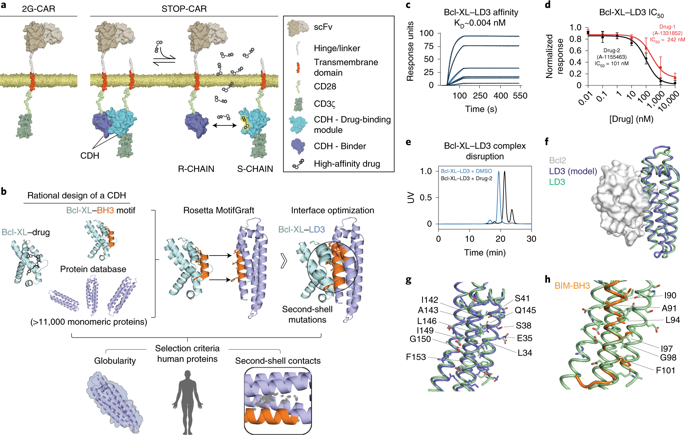Nature Biotechnology ( IF 33.1 ) Pub Date : 2020-02-03 , DOI: 10.1038/s41587-019-0403-9 Greta Giordano-Attianese 1, 2 , Pablo Gainza 3, 4 , Elise Gray-Gaillard 1, 2 , Elisabetta Cribioli 1, 2 , Sailan Shui 3, 4 , Seonghoon Kim 5 , Mi-Jeong Kwak 5 , Sabrina Vollers 3, 4 , Angel De Jesus Corria Osorio 1, 2 , Patrick Reichenbach 1, 2 , Jaume Bonet 3, 4 , Byung-Ha Oh 5 , Melita Irving 1, 2 , George Coukos 1, 2 , Bruno E Correia 3, 4

|
Approaches to increase the activity of chimeric antigen receptor (CAR)-T cells against solid tumors may also increase the risk of toxicity and other side effects. To improve the safety of CAR-T-cell therapy, we computationally designed a chemically disruptable heterodimer (CDH) based on the binding of two human proteins. The CDH self-assembles, can be disrupted by a small-molecule drug and has a high-affinity protein interface with minimal amino acid deviation from wild-type human proteins. We incorporated the CDH into a synthetic heterodimeric CAR, called STOP-CAR, that has an antigen-recognition chain and a CD3ζ- and CD28-containing endodomain signaling chain. We tested STOP-CAR-T cells specific for two antigens in vitro and in vivo and found similar antitumor activity compared to second-generation (2G) CAR-T cells. Timed administration of the small-molecule drug dynamically inactivated the activity of STOP-CAR-T cells. Our work highlights the potential for structure-based design to add controllable elements to synthetic cellular therapies.
中文翻译:

计算设计的嵌合抗原受体为 T 细胞治疗提供小分子安全开关
增加嵌合抗原受体 (CAR)-T 细胞对实体瘤的活性的方法也可能增加毒性和其他副作用的风险。为了提高 CAR-T 细胞治疗的安全性,我们基于两种人类蛋白质的结合,通过计算设计了一种化学可破坏的异二聚体 (CDH)。CDH 自组装,可以被小分子药物破坏,并具有高亲和力的蛋白质界面,与野生型人类蛋白质的氨基酸偏差最小。我们将 CDH 整合到称为 STOP-CAR 的合成异二聚体 CAR 中,该 CAR 具有抗原识别链和包含 CD3ζ 和 CD28 的内域信号链。我们在体外和体内测试了两种抗原特异性的 STOP-CAR-T 细胞,发现与第二代 (2G) CAR-T 细胞相比具有相似的抗肿瘤活性。小分子药物的定时给药动态地灭活了 STOP-CAR-T 细胞的活性。我们的工作强调了基于结构的设计为合成细胞疗法添加可控元素的潜力。











































 京公网安备 11010802027423号
京公网安备 11010802027423号